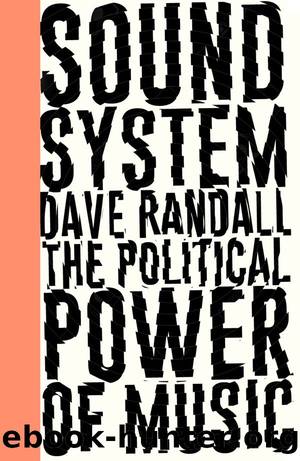Sound System: The Political Power of Music by Randall Dave

Author:Randall, Dave [Randall, Dave]
Language: eng
Format: epub
Tags: Non-Fiction, Sociology, Politics, History
ISBN: 9780745399300
Goodreads: 34696144
Publisher: Pluto Press
Published: 2017-03-20T00:00:00+00:00
F. Liszt
By the way, he must have earned at least 10,000 talers here, and his hotel bill amounted to 3,000 talers â apart from what he spent in taverns. I tell you, heâs a real man. He drinks twenty cups of coffee a day, two ounces of coffee every cup, and ten bottles of champagne, from which it can fairly safely be concluded that he lives in a kind of perpetual drunken haze . . . He has now gone off to Russia, and one wonders whether the ladies there will also go as crazy.3
Itâs telling that Liszt snubbed the adoring bourgeois women, preferring to get drunk with students. It reminds us that although rulers like to bask in the reflected glory of stars, stars donât always want to indulge them. Sometimes thatâs because they donât agree with what the rulers are doing or what they represent. Sure enough, Lisztâs choice of drinking buddies was made against the backdrop of a growing mood of disappointment with the new society. Many poor people forced off the land by âenclosure actsâ had to make their way to cities to find waged work in huge new mills and factories. Conditions were appalling â the English poet William Blake echoed the views of millions when he famously described the mills as âdark and satanicâ in a poem first published in 1808. It may have been Paganini who made a pact with the devil, but it was the new industrialists in the audience who presided over the hellish. Perhaps Lisztâs prolific champagne intake can best be understood as his attempt to avoid one of the worst hangovers in history . . . In the harsh light of the morning after the bourgeois revolutions, people were waking up to the grim realities of capitalism. As the Austrian writer Ernst Fischer described:
The sincere humanist artist was bound to feel a profound disillusionment when faced with the thoroughly prosaic, thoroughly sobering, yet disquieting results of the bourgeois-democratic revolution . . . [He] could no longer affirm such a world. He could no longer believe with a clear conscience that the victory of the bourgeoisie meant the triumph of humanity.4
Download
This site does not store any files on its server. We only index and link to content provided by other sites. Please contact the content providers to delete copyright contents if any and email us, we'll remove relevant links or contents immediately.
Kathy Andrews Collection by Kathy Andrews(11812)
The remains of the day by Kazuo Ishiguro(8977)
Paper Towns by Green John(5179)
Spare by Prince Harry The Duke of Sussex(5176)
The Body: A Guide for Occupants by Bill Bryson(5082)
Industrial Automation from Scratch: A hands-on guide to using sensors, actuators, PLCs, HMIs, and SCADA to automate industrial processes by Olushola Akande(5052)
Machine Learning at Scale with H2O by Gregory Keys | David Whiting(4293)
Be in a Treehouse by Pete Nelson(4034)
Never by Ken Follett(3937)
Harry Potter and the Goblet Of Fire by J.K. Rowling(3848)
Goodbye Paradise(3799)
The Remains of the Day by Kazuo Ishiguro(3395)
Into Thin Air by Jon Krakauer(3385)
Fairy Tale by Stephen King(3370)
The Cellar by Natasha Preston(3334)
The Genius of Japanese Carpentry by Azby Brown(3294)
120 Days of Sodom by Marquis de Sade(3262)
Reminders of Him: A Novel by Colleen Hoover(3094)
Drawing Shortcuts: Developing Quick Drawing Skills Using Today's Technology by Leggitt Jim(3075)
